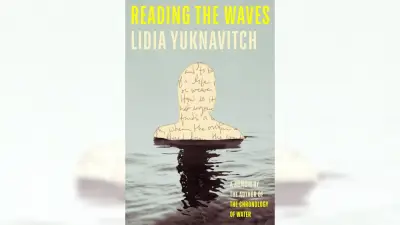Why ‘Chronology of Water’ author Lidia Yuknavitch revisits the past in ‘Reading the Waves’

There s a pocket of the literary world where the name Lidia Yuknavitch is spoken in reverent tones as if invoking a sort of high priestess You might think I exaggerate I don t It all started in March with the publication of her first book a memoir titled The Chronology of Water Among lovers of the memoir genre poetry and experimental writing it became a modern cult classic for its rich language and unique exploration of grief sexual abuse addiction and the myriad other things braided into its hypnotic form-bending narrative Now Chronology is on track to be the next buzzy indie film as Kristen Stewart makes her directorial debut having also co-written the screenplay based on Yuknavitch s memoir In the intervening years since Chronology first landed Yuknavitch s reputation as a boldly innovative author has only expanded She published the short story collection Verge and four novels including The Small Backs of Children Thrust and The Book of Joan which inspired this headline from the New York Times A Brilliant Incendiary Joan of Arc Story for a Ravaged Earth Beyond that Yuknavitch who calls the Oregon Coast home has also attracted a dedicated following for her The Misfit s Manifesto a TED Talk with over million views and counting In the inspiring presentation Yuknavitch wearing a calico dress and Doc Marten s sticks up for the eccentrics the oddballs and anyone who has ever felt like a screw-up Also a longtime creative writing instructor she s the founder of the Portland-based workshop series Corporeal Writing Now a decade and a half after Chronology she s back with another memoir Reading the Waves In countless solutions this work feels like picking up the conversation begun in Chronology all these years later themes and stories from the first book ripple through its pages now considered from vantage points offered by age and experience As she writes in the introduction I mean to make a series of returns to the people and places that marked me in approaches I have carried around in my body preponderance of my life I believe our bodies are carriers of experiences I mean to ask if there is a way to read my own past differently using what I have learned from literature how stories repeat and reverberate and release us from the tyranny of our mistakes our traumas and our confusions Now might be the time to reveal that I m not an objective source on this author and that referring to Lidia by her last name in this article feels weird I count her among my friends and we have worked together in years past I can tell you that in person Lidia is both as unpretentious as an old shoe and yet also electrifyingly intelligent to the point of nerdy She s like that shy girl in class drawing unicorns in her notebook you don t think she s paying attention until she gets called on by the guide and then says something so observant and unique that it blows everyone away Also major to know about her She s a mighty swimmer who feels the bulk at home in the water She s a tree-hugger as in she literally hugs trees We traded emails not long ago to talk about Reading the Waves Here s an edited version of our exchange Q What s outside your window right now Well there is a tree so that s good A dogwood Q One of the multiple various lines that caught me in Reading the Waves was Instead I ve chosen to spend my life creating literature as resistance Can you tell me about the meanings that sentence holds for you I think in various approaches and you can tell me if you agree with this or not all kinds of stories come at us about who we are supposed to be and how we are supposed to live our lives And we may or may not fit those stories They may help specific people and not others They may injure specific people and not others Stories about identity or thoughts or feelings and experience The stories that have come my way the stories I have inherited about daughter mother wife lover survivor facilitator writer I don t fit well I m misfitted And I m not alone So specific of us find ourselves creating and sharing stories against the grain of mainstream ideas and narratives meant to collect human experience I count myself amongst those whose stories off alternatives cracks and fissures possibility threads in the face of family social or cultural narratives that hem our hearts in While that is not the same as resistance against tyranny or violence or war it is not nothing either Storytelling is a powerful realm of resistance revolt revision change Art is a realm capable of endless resistance and transmogrify Q What prompted the return to memoir Why this why now I suspect two different confluences One our times and the pressure of these times Attacks on women on LGBTQ folks on BIPOC Repression and oppression in every epoch all over the globe breeds artistic expression The other rivulet involves aging Moving through the transformational space of menopause another word might be crucible ha And a third thing I d say is the act of returning itself drew my attention Mightily When we get old enough we tend to look back differently So I wished to ask big questions about returns I should note that I requested a salmon first Seemed logical She commented birth and death swim in the same stream Once I was writing my way through returns once I was inside the writing process narrative illuminates even better questions and ideas Q A salmon Of curriculum you did In this book you pick up threads again and again of experiences and memories and re-enter them from different points I thought about Argentinian writer Jorge Luis Borges and how he spoke about autobiographical writing as being either an opportunity to look at life in a mirror or through a prism You unfailingly choose the prism I thought of Borges too Ha And you are correct The prism is everything The mirror doesn t interest me Ever I don t even look in the mirror when I brush my teeth Q What is gained by writing deeply into our lives Well the thing is we tend to carry certain stories of ourselves around as if that is the only story of what happened to us Especially intricate stories But there are stories underneath those heavy narratives there are other vantage points there are the stories in the periphery or blind spot of what happened to us there are stories that would come to us differently if we went back through memory and sought different questions for instance about color or sound smell or light or if we exclusively continued to ask of our memory and what is the story underneath that one Writing gives us the ability to understand our human experiences as layered and expansive rather than too heavy conclusive done Writing opens experience up Writing lets memory breathe change die become again Q One of the threads in the book is about a learner in one of your classes who was murdered How has teaching made an impression on you shifted you enlarged you as a writer and a person Is it accomplishable to separate writer and person Teaching has been the formative experience of my life And by teaching I mean sharing collective and collaborative idea space with other humans The transference and transformation available when people agree to share ideas and stories even tough ones can rearrange your DNA But I m not talking about a static patriarchal lecture mode I m not talking about a knowledge king kind of teaching I m talking about people agreeing to work together to hold questions open as long as they can until meanings are reinvented in procedures that help a collective to thrive Q You received a lot of critical claim and attention in your novels Did it put a new pressure on your writing or did it serve as a kind of validation that was liberating Both all and more I have been very lucky to have had particular brilliant readers passionate readers speak to the books I have written and those experiences have been profoundly meaningful to me I don t think very much about validation I don t mean to sound like a jerk what I mean is when I receive praise I am humbled and grateful but I don t hold onto it very long or give it gigantic worth beyond the moment When I receive criticism I don t hold on to that either Both praise and criticism are fleeting experiences you know I don t think I write for affirmation or validation I think I write trying to make these small dorky bridges to others who might need a lifeline or just an image or story to ride alongside them in their lives I only ever demanded my writing to be useful to someone else Or help someone feel like it was their turn to write or create something The writing I love the greater part feels kinetic in that way to me Inspires me moves me to creative action I m pretty suspicious of prizes and accolades built from capitalism Q Is Chronology Of Water still on track to reach the big screen Have you been involved in that writing-for-film process at all Hell if I know but I think so I do know that Kristen finished filming in Latvia and I have been reported that she is in post-production now trying to finish in time for spring festivals I was a little involved early on in terms of ideation and bouncing things back and forth creatively I will also say that this film will be an arthouse film for sure She was interested in reflecting the experimental nature of the book And you know for me it s not really a classic bio pic It s more like jazz one artist riffed off of another artist s work in a kind of creative jam session That s how it feels to me I do know it will not be you know dull Q Your TED talk has more than million views the last time I checked It is still as resonant as it was nine years ago Did you have any idea that it would strike such a chord And do you still have that dress No I did not I almost died doing it That experience was much taller than me Ha yes Yes I still have the dress what a great question I saved it the way one might save a wedding dress I hope Miles her son wants it Q But let me get back to Reading the Waves Talk to me about the word transmogrify That or specific version of it repeats several times in interviews you give and in the book itself I think transmogrifying might be the central theme of the book I mean it both in terms of say frogs or butterflies and their powerful transmogrifications what that has to teach us puny humans about constant change constant life-death-life The other way I m into transmogrify has to do with fairytale and fable space That story space I was way too into Marie Louise Von Franz a participant colleague of Jung s who studied the world s fairy tales but just in general I think my novels are all oversized fables that got out of hand Q Another line I keep thinking about Your failures and fears are portals Step through For me that is the best description of writing memoir I agree I mean you supposedly get this question a lot too why go back into failures and fears in writing if it is painful I think memory and trauma and failure are carried in the body I think writing releases and rearranges and rebirths the possibility of change Q Related to that is an earlier passage I love in the book Instead of a conclusion or proof of right or wrongness I embrace storytelling again and again I look for the places where stories and lives intersect where the lines on the maps that divide us dissolve and shift It s also a way to talk about the fact that in writing any memoir we are stepping into a stream a life story that might look very different from when it is written to when it eventually arrives in a reader s hands Yes I mean even stepping into the stream moves it around Like if I wrote Chronology of Water in the present day It would be a absolutely different story Or I could STILL go back into the events of Reading the Waves and just stand in a different place from which to tell the story This idea haunts me fascinates me mesmerizes me I m still thinking about it I m still willing to progress this idea Q So much of your writing feels like an incantation When you are writing do you read aloud to yourself What helps you fall into the rhythm That makes me blush For various reason that makes me shy and happy to hear Thank you What helps me fall into the rhythm is that I can hear it and see it If I turn the volume down on my rational logical sense-making thinking and turn the volume up on my sensory perceptions imagination and subconscious creative processes So of discipline art music animals the natural world all help me achieve the right volume also sleeping Because dreams Q Hey are you reading anything now that you d recommend Are you constantly reading as you write or do you take breaks when you re in the process of a book I m dependably reading something or other or I m looking at art or listening to music art forms are pretty interchangeable to me Doesn t have to be books When I was writing Reading the Waves I turned to Meghann Riepenhoff Ice A photo book of frozen landscapes with a foreword by Rebecca Solnit Q Last thing Are these questions making any sense All of them

